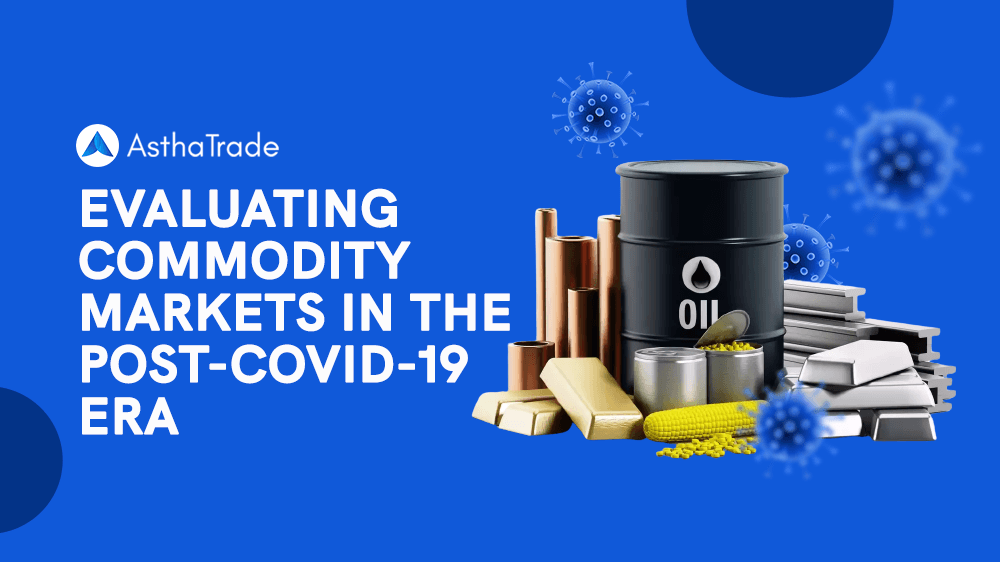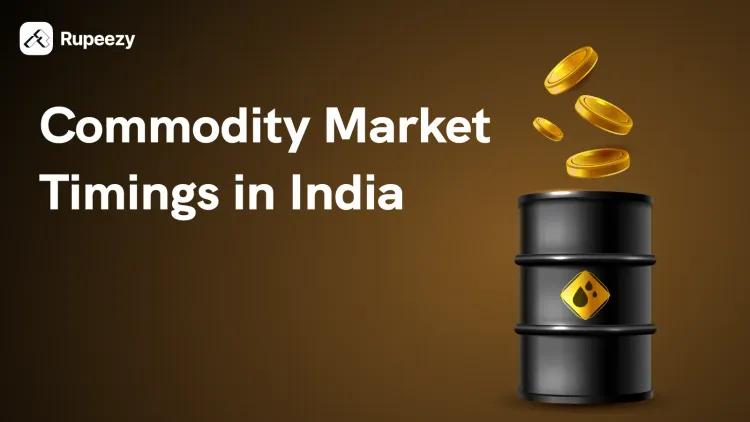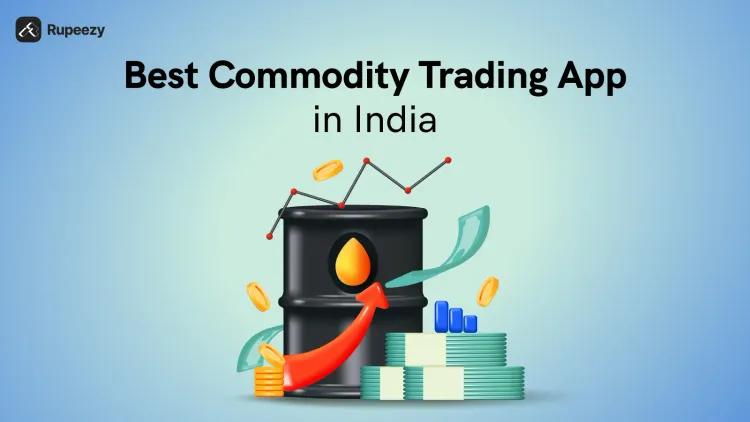What is MCX? Meaning, Trading Types, Benefits, Account Setup


00:00 / 00:00
Over the past few years, commodity trading has been gaining much importance in India, and the Multi Commodity Exchange (MCX) has evolved to become a big player among the various exchanges involved in the trading of commodities.
Equipped with modern trading technology and increased awareness, many investors are seeking MCX for the trading of commodities. Today, it’s easier than ever for retail investors to participate in the market because of the convenience of online trading and the availability of real-time data. Furthermore, the regulatory framework in India, driven by organizations like the Securities and Exchange Board of India (SEBI), ensures that trading remains transparent and secure, thereby instilling trust among traders.
In this article, we will look at the meaning of MCX, the commodities offered by MCX, the benefits and risks of trading on MCX, and the regulations of MCX.
What is MCX?
MCX is a marketplace where various commodity futures contracts are traded. Traders use these platforms to speculate on price movements or hedge risks in a wide range of products from metals like gold and silver to energy resources like crude oil and natural gas, as well as agricultural goods.
The Multi Commodity Exchange of India Limited (MCX), has transformed commodity trading in India by providing a cutting-edge platform that makes trading efficient, transparent, and secure.
Since its launch in November 2003, MCX has become a trusted space for traders and investors to manage risks and discover fair prices in the ever-evolving commodity market. The Securities and Exchange Board of India (SEBI) governs MCX with each business transaction conducted with integrity and fairness.
It has a vast spread of products on which trades can be conducted, starting from bullion and base metals to energy resources and agricultural commodities. It is the first exchange in India to offer contracts such as commodity options and futures on indices for metals and energy. MCX has an extensive network of 544 registered members and 35,096 authorized persons throughout the country as of 30th September 2024.
Popular Commodities Traded in MCX
Precious Metals
Precious metals have been significant for centuries as a form of currency, investments, and symbols of wealth. Metals such as gold and silver are integral to the MCX market today.
Gold: Often called the oldest precious metal, gold continues to be the first preference for investment and trading. The MCX offers Gold, Mini Gold, Guinea Gold, and Petal Gold among its gold derivatives.
Silver: It is another industrially used commodity that is widely traded. Commodities include Silver, Mini Silver, and Micro Silver.
Base Metals
Base metals, which can be used in construction and various manufacturing processes, are some of the most important aspects of the world economy. They are affordable and widely used, so they're popularly traded on MCX.
Aluminium
Copper
Lead
Nickel
Zinc
With its growing infrastructure and manufacturing sectors, India has an increased demand for these base metals, which are widely traded on MCX.
Energy Commodities
Energy commodities like crude oil and natural gas drive the world's economies.
Crude Oil: This is a critical Global energy source, crude oil derivatives are among the most actively traded contracts on MCX.
Natural Gas: The cleanest of all energies, Natural gas is one of the most sought-after commodities in the trading list of MCX.
These commodities are prone to global price fluctuations offering both opportunities and risks.
Agricultural Commodities
The agricultural industry of India forms a dominant part of its economy. With this, comes the basic importance of the agricultural commodity in the MCX group.
Crude Palm Oil: It is one of the largest edible oils in trading volumes worldwide. These non-traditional imported oils now account for more than half the oil consumed in India.
Cotton and Kapas: Significant raw material in India's textile industry, which is traded actively on MCX.
Mentha Oil: Mentha oil and its derivatives are extensively used in the food, pharmaceutical, perfumery, and flavoring industry. Mentha oil is one of the popular agricultural products on MCX.
Benefits of Trading on MCX
The Multi Commodity Exchange (MCX) is a leading platform for trading commodity derivatives in India. Let’s explore some of the key benefits of trading on MCX:
Diversification: One of the benefits of trading on the MCX is diversification. Commodities usually have low or no correlation to traditional asset classes such as equities and bonds, which makes them an effective tool for reducing risk.
With a wide variety of commodities including agricultural products such as sugar and soya, industrial metals, and precious metals like gold and silver, MCX allows traders the opportunity to spread their investments amongst different sectors.
For instance, during times of economic uncertainty, equities may be weak, but commodities like gold are usually considered safe assets. Research by the World Gold Council shows that a portfolio allocation of 2-10% to gold can increase risk-adjusted returns.
Risk Hedging: MCX provides an efficient mechanism for hedging, allowing businesses and investors to manage price volatility effectively. Commodity futures and options contracts on MCX help traders take a position to offset potential risks and losses in their primary investments.
For instance, a farmer anticipating a decline in crop prices can sell futures contracts to lock in a favorable price, therefore protecting their income. Similarly, industries reliant on raw materials like sugar, copper, or crude oil can hedge against price fluctuations, ensuring cost stability.
Protection Against Inflation: Commodities are one of the best tools for hedging against inflation. While the value of all traditional assets such as equities and bonds tends to diminish in a high-inflation environment, commodities such as gold and silver retain or increase in value.
Price Transparency: MCX ensures a transparent trading environment by giving real-time price information to all participants. This market environment is considered fair and encourages trust among traders because they can make the right decisions based on current data.
High Liquidity: Unlike what many think, commodity trading on MCX is very liquid. Most investors deal in commodity futures and options, which are easy to trade and settle.
The above high liquidity ensures that the traders can enter and exit positions easily, similar to other financial markets such as stocks and bonds.
Risks Involved in MCX Trading
Leverage: Leverage in commodity trading amplifies both profits and losses. While leverage can magnify profits, it equally magnifies losses, making it a double-edged sword. Traders must use leverage cautiously to avoid substantial losses.
High Volatility: Commodities are more volatile than stocks and bonds. Prices are influenced by the dynamics of demand and supply, geopolitical events, and general economic trends. For instance, crude oil or gold prices can swing widely, even double the volatility of the stock. Such drastic changes can disrupt your trading strategy and lead to unexpected outcomes.
Sensitivity to Geopolitical Events: Commodity prices are highly susceptible to macroeconomic and geopolitical factors. A shift in crude oil production levels or a global crisis, such as the COVID-19 pandemic, can significantly affect prices. Traders must be updated with global news and trends to predict market movements accurately.
Inflation May Not Always Work in Your Favor: While commodities are often seen as a hedge against inflation, this isn't always reliable. During economic crises like 2008, inflation paired with reduced demand halted production and weakened the commodity market. This demonstrates that commodities aren’t immune to broader economic challenges.
Challenges for Long-Term Investors: Commodities are not suitable for "buy-and-hold" strategies because they are cyclical. For example, the Bloomberg Commodity Index has revealed that even government bonds have provided historically better returns. Long-term investors may find commodity investments less rewarding than other asset classes.
Start Trading on MCX with Rupeezy
Step 1: Select Rupeezy as the Broker
Rupeezy, being a registered broker for SEBI and MCX, delivers low brokerage, margin trading, excellent support, and research tools ideal for commodity trading.
Step 2: Open an Account
Proceed to the Rupeezy website, click 'Open Demat Account', and fill in personal and financial information into the account opening form.
Step 3: Upload Documents
Submit your PAN, Aadhaar, bank details, a passport-size photograph, and proof of address. Additional documents like income proof or a canceled cheque may be required.
Step 4 - Complete e-KYC
Verify your identity and address through Rupeezy’s e-KYC process by providing details of your occupation and annual income.
Step 5 - Access the Platform
After account approval, log in to Rupeezy’s trading platform via its website or app.
Step 6 - Fund Your Account
Use net banking, UPI, or other options to fund your account. Maintain sufficient funds to avoid any marginal calls during trading.
Step 7 - Familiarize with the Platform
Get to know the market data, tools, and watchlist that will help you to trade effortlessly.
Step 8 - Plan Your Trades
You can devise a plan depending on your goals and research. You can identify trading opportunities using fundamental and technical analysis techniques.
Step 9 - Trading Begins
Place trades on Rupeezy and remember to use stop-loss orders to keep your risks and investment safe from market fluctuations.
Step 10 - Monitor and Improve
Review your trades constantly, track the performance, and refine your strategies to stay ahead in the game.
Regulations and Security of the MCX Market
The regulation of commodity markets plays a vital role in ensuring fairness, efficiency, and transparency. Its primary goals are to safeguard the interests of the participants, minimize risks, and uphold financial stability.
In India, the commodity derivatives market operates under a three-tier regulatory framework that involves the central government, SEBI, and commodity exchanges.
Central Government: The central government derives various policies governing the commodity exchanges and determines which commodities are eligible for trading.
Securities and Exchange Board of India (SEBI): SEBI is the regulatory authority that enforces the government’s policies while focusing on protecting investor interests and promoting market development. It also ensures adherence to rules and fair practices within the commodity markets.
Commodity Exchanges: Exchanges play a crucial role in designing products that are traded in the market and ensuring compliance with regulatory norms. They serve as the operational hub for market activities.
Securities Contracts (Regulation) Act 1956
The Securities Contracts (Regulation) Act, 1956 (SCRA) serves as a foundational pillar of regulation for India's commodity and securities markets. The SCRA provides the government with direct and indirect control over almost every aspect related to securities trading as well as stock exchange transactions. Some notable provisions under this Act include:
Granting recognition of the exchanges
Corporatization and demutualization of stock exchanges.
The power of the central government to call for periodical returns from stock exchanges.
The power of SEBI to make or amend by-laws of recognized stock exchanges.
The power of the central government (also exercisable by SEBI) to supersede the governing body of a recognized stock exchange.
The power to suspend the business of recognized stock exchanges.
The power to prohibit undesirable speculation.
Conclusion
The Multi Commodity Exchange (MCX) has revolutionized commodity trading in India by offering a transparent, efficient, and secure trading platform. With a broad range of commodities, including metals, energy, and agricultural products, MCX provides opportunities for diversification, hedging, and inflation protection. However, traders must remain cautious about risks like leverage, volatility, and geopolitical influences. Backed by robust regulatory frameworks and oversight from SEBI, MCX ensures trust and fairness in the market, making it a reliable choice for both retail and institutional investors.
FAQs
Q. What is MCX?
MCX (Multi Commodity Exchange) is India’s leading platform for trading commodity derivatives like gold, silver, crude oil, and agricultural products.
Q. What is MCX Gold?
MCX Gold involves trading gold derivatives such as Gold, Mini Gold, and Petal Gold contracts on the MCX platform for hedging or investment.
Q. What is MCX Trading?
MCX trading is the buying and selling of commodity futures and options to manage price risks or speculate on price movements.
Q. What is MCX in the Share Market?
MCX is a publicly listed entity that operates as India’s primary commodity exchange for trading derivatives with a 95% share in the Commodity market in India.
Q. How does MCX trading work?
When you trade on the MCX, you buy and sell futures and options contracts for goods through an online trading platform. Traders bet on the prices of goods in the future, protect themselves from possible risks, or spread out their investments.
Q. Is trading in MCX good?
For investors looking to diversify their portfolios, insure against potential risks, and increase their exposure to commodities, trading on the MCX can be a good option. But it’s crucial to comprehend the risks involved and put the right risk management techniques in place.
Q. What is an MCX example?
Purchasing a gold futures contract, which is an agreement to buy a specific quantity of gold at a specified price on a future date, is an example of MCX trading. This enables the trader to forecast gold’s future price and potentially profit from changes in that price.
Q. Is MCX trading risky?
Risks related to price volatility, leverage, and market uncertainty are inherent to MCX trading. By implementing sensible risk management techniques, diversifying their holdings, and keeping up with market news, traders can, however, reduce these risks.
Q. What is the best time to trade in MCX?
The best times to trade on the MCX are during the opening hours (9:00 AM), overlapping market sessions, periods of high volatility, and shortly after major economic announcements for optimal liquidity and price movement.
Q. How much tax do you pay on MCX trading?
The type of your gains determines the tax you pay on MCX trading. Short-term capital gains are taxed at 20%. Additionally, when selling futures and options contracts, traders are subject to the Securities Transaction Tax (STT).
Check Out These Related Articles |
The content on this blog is for educational purposes only and should not be considered investment advice. While we strive for accuracy, some information may contain errors or delays in updates.
Mentions of stocks or investment products are solely for informational purposes and do not constitute recommendations. Investors should conduct their own research before making any decisions.
Investing in financial markets are subject to market risks, and past performance does not guarantee future results. It is advisable to consult a qualified financial professional, review official documents, and verify information independently before making investment decisions.

All Category








